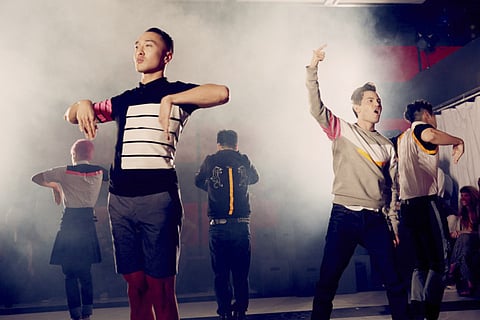Do you know how to KPop? There’s a show for it
The immersive show offers a guided, room-by-room tour of a Korean hit factory that is hoping to capture a market that has long eluded it: the US

So just how do you define the phenomenon known as K-pop — or, for that matter, the new multistranded, multichambered immersive performance piece called KPOP, which occupies two floors of a building in Hell’s Kitchen, New York City?
Jerry, a self-styled cultural ambassador in this sprawling show, tells us that according to “my team,” K-pop is “comprised of various styles, tropes and audiovisual elements” that include pop, rock, hip-hop, R&B, jazz, funk, reggae, folk, electronica, rave, techno and nu metal... and the list goes on. Jerry adds as a footnote that he has now fired his team.
It’s understandable that even a slick huckster like Jerry, played with an anxious smile by James Seol, has been led to the brink of a nervous breakdown in trying to come to terms with the nature of K-pop. Similarly, KPOP the show — an ARS Nova production in collaboration with Ma-Yi Theater Company and Woodshed Collective, which opened on Friday night at A.R.T./New York — vibrates with the frenzy of its contradictions.
It’s a satire! It’s a soap opera! It’s a deep dive into the conflicted heart of a divided land! It’s a sweaty celebration of perky young talent and a cold-eyed look at an industry that eats its stars for breakfast! It’s a feel-good romp and a feel-bad psychodrama, with detours into the shadowlands of xenophobia, racism and child labour!
And for any theatergoer who participates in this movable junk-food buffet, KPOP is likely to come across as entertaining and enervating, in fairly equal measures.
Conceived by the Woodshed Collective and the playwright Jason Kim, with direction by Teddy Bergman and songs by Helen Park and Max Vernon, KPOP offers a guided, room-by-room tour of a Korean hit factory that is hoping, finally, to capture a market that has long eluded it: the United States. To achieve this goal, JTM Entertainment — which is run by a Mr. Moon (James Saito) and his wife, Ruby (Vanessa Kai) — has enlisted the services of the aforementioned Jerry Kim, a Korean-American who heads the explicitly named Crossover agency.
Jerry claims that his company has been responsible for the stateside success of the likes of “Shakira, Zara, Ikea, Hugh Jackman and Le Pain Quotidien.”
We, the audience, are asked to be his focus group, gathered to offer suggestions on how to make JTM’s flavour of pop stars more palatable to Americans.
Theatergoers are divided into different teams (according to the colour of wrist bands issued before the show begins) and ushered through a series of meticulously imagined rehearsal spaces, recording studios, cosmetic analysis rooms and a theatre-cum-bar, where we are allowed to observe the finished product.
That would be a newly reorganised boy band (called F8, and pronounced “fate”) and a girl band (Special K). There is also the label’s reigning solo artist, MwE (a divinely petulant Ashley Park, who wears Tricia Barsamian’s haute girl-goddess costumes as if they were sweatsuits). Kim clearly had a swell time devising names.
Among those on hand to knead the would-be stars into shape are a vocal coach (Amanda Morton), a plastic surgeon (David Shih) and an American choreographer (Ebony Williams). Though there are references throughout to the unforgiving Korean ethic of perfectionism, what the young performers endure in the name of their craft doesn’t seem all that different from what we are told Simon Cowell’s proteges are put through.
Of course, the frictions within prefab groups like the Spice Girls and One Direction probably didn’t include the mini-culture wars that threaten to tear F8 asunder. The group’s flashiest new recruit, Epic (a spot on Jason Tam, as smooth as Jell-O pudding), is too anglophone for the tastes of his bandmates.
The resulting confrontations lead to Epic’s main antagonist, Oracle (Jinwoo Jung), drawing a line down the middle of a rehearsal room and asking the audience to choose a side. Uh-oh! I believe we have a combustible political metaphor on our hands here, which — given the current international situation — is a little queasy-making, as are Jerry’s jokey references to launching “rockets” into the American market.
In a less topical vein, we have the agonies of the lovely MwE, who at 26 is approaching her sell-by date and who receives us in a suspended cocoon chair in her special downtime room. (Gabriel Hainer Evansohn’s sets are marvels of manicured kitsch.) As MwE shifts jerkily between autopilot charm and rebellion against Ruby, her manager (and creator), you may feel you’ve stumbled into an enjoyably hokey remake of Valley of the Dolls.
Like the young stars it portrays, KPOP sometimes works too hard to put itself over. It is least interesting at its most didactic. And it suffers from its own conflicted intentions.
The show is best when parody blurs into the already surreal dimensions of what’s being parodied. That’s true of the eye-popping visuals throughout (right down to the ads on the walls). And Park’s and Vernon’s pastiche fusion musical numbers, choreographed with slashing wit by Jennifer Weber, are as synthetically sweet and perversely addictive as the real thing. (Think of them as ear Skittles.)
Many of the drinking-age audience members (there is a real bar, don’t forget) with whom I saw KPOP reacted to the climactic performance of these numbers as if they were giddy teenagers at a bona fide concert. But what about all those hard truths we learnt along the way, about the unsavory ingredients that go into such crowd-courting performances?
By that time, all disparate messages appeared to have melded into one high-volume command. Which would be, if I may borrow an oft-recycled mainstream song title (and that’s appropriate, I think): “Shut up and dance.”



